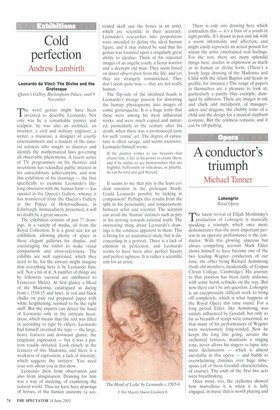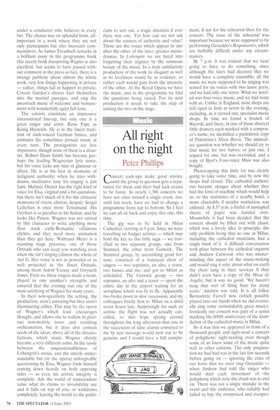A conductor's triumph
Michael Tanner
Lohenqrin
Royal Opera The latest revival of Elijah Moshinsky's
he of Lohengrin is musically speaking a triumph, which once more demonstrates that the most important person in an operatic performance is the conductor. With this glowing, spacious but always compelling account Mark Elder shows himself to have become one of the two leading Wagner conductors of our time, the other being Richard Armstrong (both old members, incidentally, of Corpus Christi College, Cambridge). His journey to that position has been fairly arduous, with some harsh setbacks on the way. But now there can't be any question: Lohengrin is an exceptionally difficult work to bring off completely, which is what happens at the Royal Opera this time round. For a long period Elder. like Armstrong, was unduly influenced by Goodall, but only so far as breadth of tempi were concerned, so that many of his performances of Wagner were wearisomely long-winded. Now he keeps the long line going, aerates the orchestral textures, maintains a singing tone, never allows his singers to lapse into mere declamation — which is almost inevitable in this opera — and builds to overwhelming climaxes over huge timespans (all of them Goodall characteristics, of course). The ends of the first two acts were breathtaking.
Once more, too, the orchestra showed how marvellous it is when it is fully engaged, in music that is worth playing and under a conductor who believes in every bar. The chorus was on splendid form, allimportant in a work where they are not only participants but also incessant commentators. As James Treadwell remarks in a brilliant essay in the programme book (his recent book Interpreting Wagner is also excellent, but seems to have passed without comment in the press so far), there is a strange publicity about almost the whole work, very few things happening in private — rather, things fail to happen in private. Covent Garden's chorus hurl themselves into the martial passages, and sing the awestruck music of welcome and bemusement with wonderfully quiet full tone.
The soloists constitute an impressive international line-up, but only one is a great singer and artist: Rene Pape as Konig Heinrich. He is in the finest tradition of dark-voiced German basses, and animates his sometimes prosaic music at every turn. The protagonists are less impressive, though none of them is a disaster. Robert Dean Smith has become perhaps the leading Wagnerian lyric tenor, but his voice lacks any hint of glamour or allure. He is at his best in moments of indignant authority; when he tries withdrawn, meditative tone his singing is just faint. Melanie Diener has the right kind of voice for Elsa, virginal and a bit querulous, but there isn't much of it for the climactic moments of vision, elation, despair. Sergei Leiferkus is once more Telramund. His German is as peculiar as his Italian, and he looks like Pimen. Wagner was not stirred by this character to write anything more than stock early-Romantic villainous clichés, and they need more animation than they get here. Waltraud Meier is a stunning stage presence, one of those Ortruds who can keep you watching even when she isn't singing (almost the whole of Act I). Her voice is not as powerful or as well projected as the finest Ortruds, among them Astrid Varnay and Gwyneth Jones. Even so, these singers made a team, played to one another's strengths and ensured that the evening was one of the most satisfying of Wagner for many years.
In their non-specificity the setting, the production, aren't annoying but they aren't illuminating either. This may be the opera of Wagner's which least encourages thought, and allows one to wallow in glorious non-motivic tunes and ravishing orchestration, but it does also contain seeds of the ideas, above all of the dissatisfactions, which made Wagner shortly become a very different artist. In the tussle between the unquestionableness of Lohengrin's status, and the utterly understandable but (in the opera) unforgivable questioning by Elsa, Wagner finds himself coming down heavily on both opposing sides — as ever, his artistic integrity is complete. Ask the world of transcendent value what its claims to inviolability are and it falls on top of you, or withdraws completely, leaving the world to the politi
cians to sort out, a tragic situation if ever there was one. Yet how can we not ask about the sources of authority and value? Those are the issues which appear in one after the other of the later, greater musicdramas. In Lohen grin we are lured into forgetting their urgency by the sensuous beauty of the music. In a truly satisfactory production of the work its disquiet as well as its loveliness would be in evidence, or rather each would gain from the intensity of the other. At the Royal Opera we have the music, and in the programme we find the questions being raised. For its next production it needs to take the step of uniting the two on the stage.



































































































 Previous page
Previous page